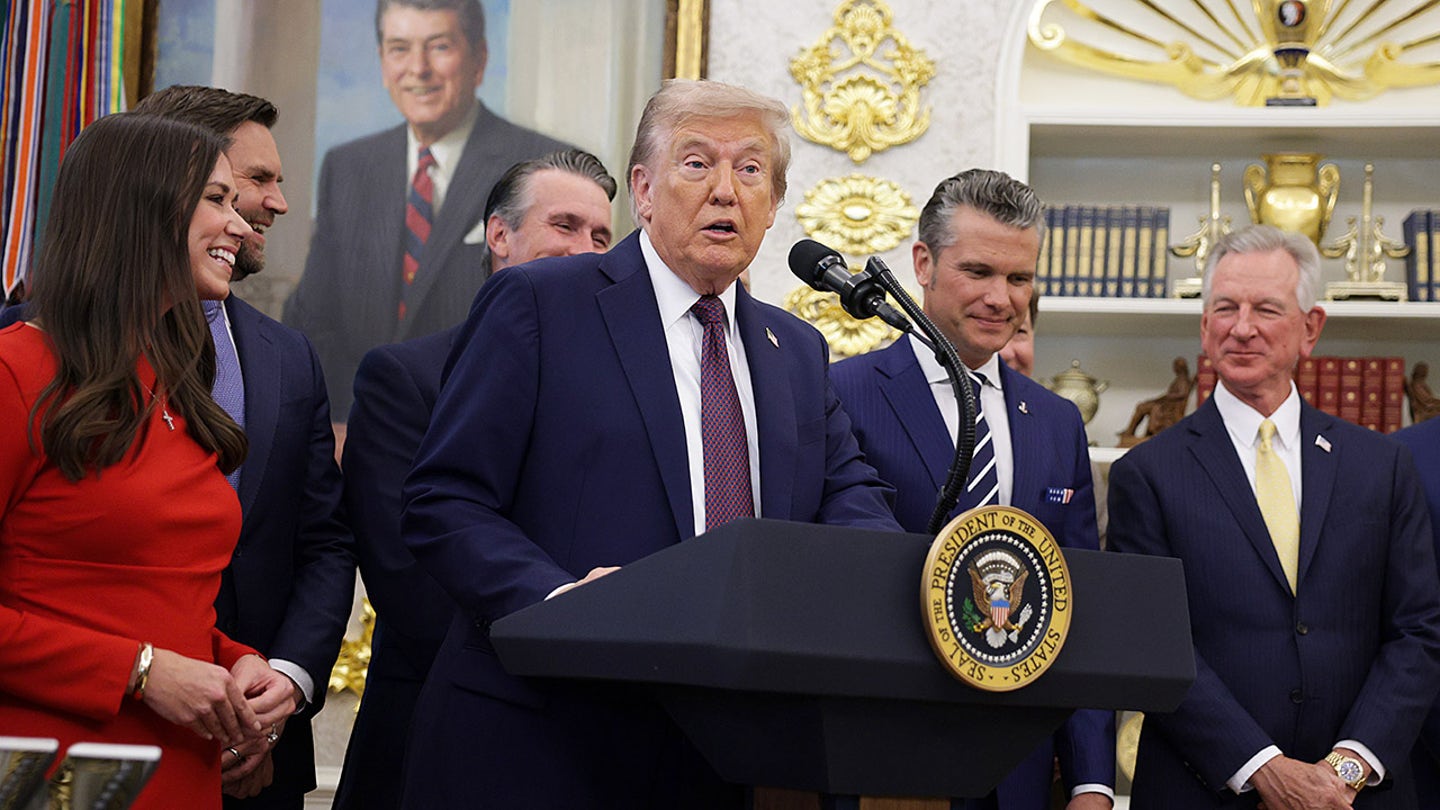
Vanderbilt LB, Ex-Hawaii QB Among College Athletes Suing NCAA Over Redshirt Rule
Entities mentioned:
- NCAA: Control, Power, Self-preservation
- Langston Patterson: Ambition, Competitive spirit, Self-respect
- Brayden Schager: Ambition, Competitive spirit, Self-respect
- Ryan Downton: Justice, Determination, Professional pride
- Diego Pavia: Ambition, Competitive spirit, Justice
Article Assessment:
Credibility Score: 75/100
Bias Rating: 55/100 (Center)
Sentiment Score: 45/100
Authoritarianism Risk: 35/100 (Generally Democratic)
Bias Analysis:
The article presents both sides of the argument, including statements from the plaintiffs and the NCAA. While it gives more space to the athletes' perspective, it maintains a largely neutral tone in reporting the facts of the case.
Key metric: Educational Attainment
As a social scientist, I analyze that this lawsuit challenges the NCAA's redshirt rule, which impacts athletes' ability to fully utilize their collegiate eligibility. The case highlights tensions between athletic governance and individual athlete rights, potentially affecting educational attainment metrics. If successful, it could lead to extended playing time for athletes, possibly improving their professional prospects but also potentially extending their time in higher education. This could influence graduation rates and the overall educational experience of student-athletes, particularly in high-profile sports programs.

Trump references Alabama’s stunning defeat in Space Command announcement as Tuberville gloats about Auburn
Entities mentioned:
- Donald Trump: Power, Influence, Recognition
- Tommy Tuberville: Pride, Loyalty, Competitive spirit
- Alabama Football Team: Competitive spirit, Pride, Determination
- Auburn Football Team: Competitive spirit, Pride, Determination
- Florida State Football Team: Competitive spirit, Determination, Recognition
- Nick Saban: Legacy, Professional pride, Influence
- Kalen DeBoer: Ambition, Professional pride, Determination
Article Assessment:
Credibility Score: 75/100
Bias Rating: 55/100 (Center)
Sentiment Score: 50/100
Authoritarianism Risk: 30/100 (Generally Democratic)
Bias Analysis:
The article presents a relatively balanced view, focusing mainly on reporting events without overt political slant. While it includes Trump's comments, it doesn't editorialize them, maintaining a neutral stance.
Key metric: Public Opinion and Political Influence
As a social scientist, I analyze that this article, while primarily about college football, subtly illustrates the intertwining of sports and politics in American culture. Trump's reference to a football upset during a Space Command announcement demonstrates how sports are used as a common ground for political figures to connect with constituents. The mention of Tuberville, a former coach turned senator, further emphasizes this sports-politics nexus. This intersection can impact public opinion and political influence by humanizing political figures and providing relatable talking points. The article also highlights the cultural significance of college football in certain regions, particularly the South, and how it can be leveraged for political gain. The stark contrast between Auburn's victory and Alabama's loss serves as a metaphor for political fortunes, which can shift dramatically and unexpectedly.

Cowboys great Troy Aikman questions Jerry Jones' priorities after Micah Parsons trade
Entities mentioned:
- Jerry Jones: Power, Recognition, Ambition
- Troy Aikman: Righteousness, Loyalty, Professional pride
- Dallas Cowboys: Competitive spirit, Legacy, Pride
- Micah Parsons: Ambition, Professional pride, Self-preservation
- Green Bay Packers: Competitive spirit, Ambition
Article Assessment:
Credibility Score: 75/100
Bias Rating: 55/100 (Center)
Sentiment Score: 35/100
Authoritarianism Risk: 20/100 (Strongly Democratic)
Bias Analysis:
The article presents multiple perspectives, including quotes from Troy Aikman and references to Jerry Jones' own statements, providing a relatively balanced view. However, there's a slight lean towards criticizing Jones' management style, which nudges it slightly right of center.
Key metric: NFL Team Performance and Fan Engagement
As a social scientist, I analyze that this article highlights the tension between team performance and media attention in professional sports management. Jerry Jones' decision to trade star player Micah Parsons appears to prioritize generating publicity over on-field success, which conflicts with traditional sports management goals. This approach potentially impacts team morale, fan loyalty, and long-term competitive success. The criticism from respected former player Troy Aikman suggests a growing disconnect between ownership and football operations, which could have broader implications for team culture and performance. The article also underscores the challenge of balancing short-term media buzz with long-term strategic planning in modern sports franchises.

Mark Teixeira discusses political divide, says he can’t talk to people that believe ‘men can get pregnant'
Entities mentioned:
- Mark Teixeira: Righteousness, Duty, Ambition
- Democratic Party: Control, Influence, Unity
- Republican Party: Loyalty, Determination, Freedom
- Dan Dakich: Professional pride, Curiosity, Influence
- Chip Roy: Ambition, Power, Influence
Article Assessment:
Credibility Score: 65/100
Bias Rating: 75/100 (Lean Right)
Sentiment Score: 40/100
Authoritarianism Risk: 35/100 (Generally Democratic)
Bias Analysis:
The article leans right, presenting Teixeira's conservative views without significant counterbalance. It sources from Fox News and OutKick, known for conservative leanings, and frames progressive ideas in a dismissive manner.
Key metric: Political Polarization Index
As a social scientist, I analyze that this article highlights the growing political polarization in the United States, as exemplified by Mark Teixeira's comments. His inability to engage in dialogue with those holding certain progressive views indicates a breakdown in communication between ideological groups. This polarization is likely to impact political discourse, policy-making, and social cohesion. Teixeira's transition from sports to politics represents a trend of non-traditional candidates entering the political arena, often appealing to populist sentiments. His emphasis on 'America First' and traditional values suggests a conservative platform that may resonate with his target constituency but could further entrench existing divides.

Trump to attend Yankees game in New York on 24th anniversary of Sept. 11 attacks: sources
Entities mentioned:
- Donald Trump: Power, Recognition, Influence
- Tommy Tuberville: Pride, Loyalty, Professional pride
- Alabama Football Team: Competitive spirit, Pride, Determination
- Florida State Football Team: Competitive spirit, Determination, Recognition
- Auburn Football Team: Competitive spirit, Pride, Determination
- Nick Saban: Legacy, Professional pride, Influence
- Kalen DeBoer: Ambition, Professional pride, Recognition
Article Assessment:
Credibility Score: 70/100
Bias Rating: 55/100 (Center)
Sentiment Score: 55/100
Authoritarianism Risk: 30/100 (Generally Democratic)
Bias Analysis:
The article presents a relatively balanced view, focusing mainly on sports events. However, it gives slightly more positive attention to Trump and Republican-associated entities (Alabama, Auburn) than to other perspectives.
Key metric: Public Trust in Government
As a social scientist, I analyze that this article, while primarily focused on college football, subtly impacts public trust in government. The casual mention of a significant government decision (Space Command headquarters relocation) in the context of sports banter demonstrates how political decisions can be trivialized or overshadowed by popular culture. This intertwining of politics and entertainment potentially affects how seriously the public perceives governmental actions, possibly eroding trust in the decision-making process. The article's focus on football over the policy implications of the Space Command move suggests a prioritization of entertainment over governance in public discourse.

Trump announces the World Cup draw will be held at DC’s Kennedy Center as he brings together two second-term priorities
Entities mentioned:
- Donald Trump: Power, Control, Legacy
- FIFA: Influence, Recognition, Professional pride
- Kennedy Center: Legacy, Influence, Recognition
- Gianni Infantino: Influence, Recognition, Professional pride
- Democrats: Indignation, Moral outrage, Justice
- Republican Party: Loyalty, Power, Control
Article Assessment:
Credibility Score: 70/100
Bias Rating: 55/100 (Center)
Sentiment Score: 45/100
Authoritarianism Risk: 65/100 (Authoritarian Tendencies)
Bias Analysis:
The article presents multiple viewpoints, including Trump's actions and Democratic criticisms. However, it leans slightly towards emphasizing Trump's control and changes, potentially suggesting a slight center-right bias.
Key metric: Political Polarization Index
As a social scientist, I analyze that this article highlights the increasing politicization of cultural institutions in the United States. Trump's takeover of the Kennedy Center, traditionally non-partisan, and its use for a major international sporting event demonstrates a blending of politics, culture, and sports. This action likely increases political polarization by turning a cultural landmark into a point of political contention. The reprogramming of the Kennedy Center and the reactions from artists and Democrats indicate a deepening divide in how different political factions view the role of cultural institutions. This event may contribute to further erosion of shared national symbols and experiences, potentially exacerbating existing political and cultural divides in American society.

Golf
Entities mentioned:
- Charlie Woods: Ambition, Competitive spirit, Recognition
- Tiger Woods: Legacy, Influence, Pride
- Keegan Bradley: Duty, Professional pride, Self-respect
- Donald Trump: Influence, Recognition, Power
- Tommy Fleetwood: Ambition, Professional pride, Recognition
- Scottie Scheffler: Ambition, Competitive spirit, Determination
- Miyū Yamashita: Ambition, Recognition, Professional pride
- Kipp Popert: Determination, Ambition, Recognition
- Rory McIlroy: Competitive spirit, Ambition, Redemption
- Steven Alderson: Determination, Self-respect, Recognition
- J.J. Spaun: Professional pride, Recognition, Ambition
- Gary Woodland: Self-preservation, Determination, Professional pride
- Maha Haddioui: Professional pride, Recognition, Influence
- Annika Sorenstam: Legacy, Influence, Professional pride
Article Assessment:
Credibility Score: 75/100
Bias Rating: 50/100 (Center)
Sentiment Score: 60/100
Authoritarianism Risk: 20/100 (Strongly Democratic)
Bias Analysis:
The article presents a balanced view of golf, covering various aspects without apparent favoritism. It includes diverse stories and perspectives, maintaining neutrality in its reporting of different events and personalities.
Key metric: Sports Industry Economic Impact
As a social scientist, I analyze that this article showcases the diverse and evolving landscape of professional golf. It highlights emerging talents like Charlie Woods, the son of golfing legend Tiger Woods, indicating a generational shift in the sport. The article also touches on various aspects of golf, from major tournament victories to unique challenges faced by players, and even environmental concerns about lost golf balls. The inclusion of stories about disabled golfers and international players suggests an increasing focus on inclusivity and globalization in the sport. The economic impact of golf is evident through mentions of luxury resorts and brand involvement. The article's broad coverage of different tournaments, players, and related topics indicates the sport's significant economic footprint and cultural relevance, which directly influences the sports industry's economic impact in the US.
- Read more about Golf
- Log in to post comments

Loneliness, resiliency and using Madden: The life of the NFL’s most prolific journeyman
Entities mentioned:
- Josh Johnson: Determination, Professional pride, Self-respect
- NFL: Competitive spirit, Power, Control
- Jim Harbaugh: Ambition, Professional pride, Control
- San Francisco 49ers: Competitive spirit, Ambition, Professional pride
Article Assessment:
Credibility Score: 85/100
Bias Rating: 50/100 (Center)
Sentiment Score: 65/100
Authoritarianism Risk: 20/100 (Strongly Democratic)
Bias Analysis:
The article presents a balanced view of Johnson's career, including both challenges and successes. It relies heavily on direct quotes from Johnson, providing a personal perspective without apparent ideological slant.
Key metric: Professional Athlete Resilience and Adaptability
As a social scientist, I analyze that Josh Johnson's career trajectory exemplifies the challenges and resilience required in professional sports, particularly in the NFL. His experience highlights the precarious nature of athletic careers, the importance of adaptability, and the psychological toll of constant relocation and team changes. Johnson's story illustrates the intersection of personal determination, professional sports business practices, and the impact of transient lifestyles on family dynamics. The article also underscores the value of networking, continuous learning, and personal branding in maintaining a long-term career in a highly competitive field.

Olympic champion Imane Khelif fights World Boxing’s genetic sex testing rule
Entities mentioned:
- Imane Khelif: Justice, Self-respect, Competitive spirit
- World Boxing: Control, Professional pride, Security
- Court of Arbitration for Sport: Justice, Duty, Impartiality
- International Boxing Association: Control, Power, Influence
- International Olympic Committee: Influence, Professional pride, Control
- Kirsty Coventry: Duty, Justice, Professional pride
Article Assessment:
Credibility Score: 75/100
Bias Rating: 45/100 (Center)
Sentiment Score: 35/100
Authoritarianism Risk: 40/100 (Generally Democratic)
Bias Analysis:
The article presents a balanced view of the situation, including perspectives from multiple stakeholders. It provides context for the controversy without overtly favoring any particular side, maintaining a neutral tone in reporting the facts.
Key metric: Gender Equality in Sports
As a social scientist, I analyze that this article highlights a significant tension between athletic fairness, individual rights, and gender identity in international sports. The case of Imane Khelif exemplifies the complex challenges facing sports governing bodies in establishing and implementing sex eligibility rules. This controversy impacts gender equality in sports by potentially excluding athletes based on genetic testing, which could disproportionately affect women and intersex individuals. The shifting landscape of boxing governance, from IBA to World Boxing, demonstrates the political nature of these decisions and the pressure organizations face to create standardized policies. The involvement of the IOC and CAS underscores the global significance of this issue, extending beyond boxing to impact Olympic sports broadly. This case may set a precedent for how gender eligibility is determined in high-level sports competitions, potentially influencing policies across various athletic disciplines.

Micah Parsons may need epidural injection to make Packers debut in Week 1: report
Entities mentioned:
- Micah Parsons: Ambition, Professional pride, Recognition
- Dallas Cowboys: Competitive spirit, Control, Self-preservation
- Green Bay Packers: Ambition, Competitive spirit, Recognition
- Jerry Jones: Control, Power, Self-preservation
- Rasheed Walker: Enthusiasm, Loyalty, Competitive spirit
Article Assessment:
Credibility Score: 75/100
Bias Rating: 50/100 (Center)
Sentiment Score: 55/100
Authoritarianism Risk: 20/100 (Strongly Democratic)
Bias Analysis:
The article presents a balanced view of the situation, including perspectives from multiple sources and teams. It avoids overtly partisan language or framing, maintaining a neutral stance on the trade and its potential outcomes.
Key metric: NFL Team Performance
As a social scientist, I analyze that this article highlights the complex interplay between player health, team strategy, and financial considerations in professional football. The transfer of Micah Parsons from the Dallas Cowboys to the Green Bay Packers represents a significant shift in team dynamics and potential performance outcomes. The reported back injury and possible need for an epidural injection introduces an element of uncertainty regarding Parsons' immediate impact on his new team. This situation underscores the risks associated with high-profile trades and contract negotiations in the NFL, as well as the pressure on players to perform despite health concerns. The positive sentiment from teammates like Rasheed Walker suggests a potential boost in team morale and expectations, which could influence overall team performance. However, the actual impact on the field remains to be seen, contingent on Parsons' health and ability to integrate into the Packers' defensive system.